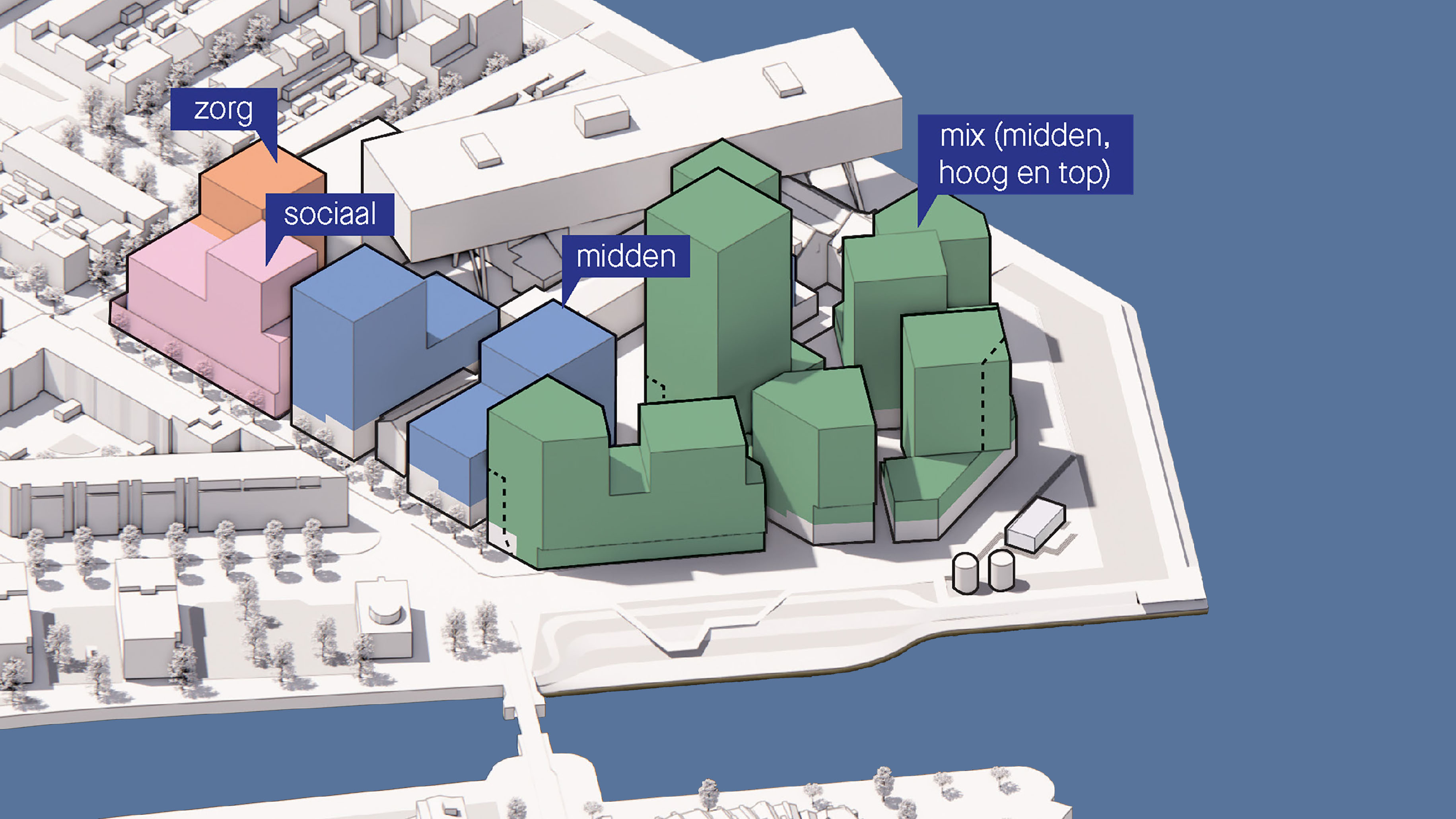
Living at De Kaai
Redevelopment of an industrial site into a sustainable and affordable residential area
Living and working in an inclusive and vibrant neighbourhood
High-quality housing with lively waterfronts, with great attention to nature inclusivity
A prominent new development is rising along the River Maas in Rotterdam: De Kaai. The former site of the Upfield margarine factory—located opposite Noordereiland and De Hef, and famous for its enormous peanut butter jars on the quay—is being transformed into a new, inclusive residential district.
EGM is responsible for the structural plan, BIM coordination, and engineering, as well as designing the buildings—except for the façades. A selection of emerging architectural firms is given the opportunity to shape their vision for the façade designs, after which EGM engineers them. Developer VORM acquired this location in 2021 in partnership with Amvest and, in collaboration with the Municipality of Rotterdam, Mecanoo, and De Urbanisten, has developed an ambitious master plan for approximately 1,000 new homes.
A symbiosis of past and future
De Kaai will offer a unique mix of residential, work, and recreational spaces, while honouring and integrating the site’s industrial heritage. Characteristic elements of the former factory, such as distinctive cast-iron structures and its spacious layout, will be preserved and transformed into inspiring workspaces. By linking this historical context with innovative architecture, the district remains rooted in nostalgia while being future-oriented. The iconic former Unilever building ‘De Brug’, which continues to serve as office space, will be retained. In true Rotterdam style, De Kaai will also provide approximately 10,000 m² of space for non-residential functions, with a large portion dedicated to business activities.
Sustainability at its core
Sustainability is a fundamental principle in De Kaai’s design, integrating a broad range of sustainable solutions. High-performance insulation, eco-friendly materials, and intelligent climate systems will ensure that the buildings have minimal energy requirements. Wherever possible, existing building materials will be repurposed, reducing waste and lowering the ecological footprint. Green roofs and façades, covered with diverse vegetation, will enhance biodiversity, improve air quality, and provide natural temperature regulation.
As the site is located outside the primary flood defences, the ground level will be raised. A smart water management system will collect and reuse rainwater, reducing pressure on the drainage system and ensuring water availability during dry periods. A cascading rainwater feature will make this system visible to Rotterdam residents. The Municipality of Rotterdam will green the quays, incorporating tidal shorelines along the waterfront to promote rich biodiversity.
A homely and inclusive neighbourhood
De Kaai will become a place where people of all life stages feel at home, with housing that meets a variety of living needs. The housing supply will consist of 10% social housing and 50% mid-range rental and owner-occupied homes, delivering over 600 affordable residences, which are in high demand. A diverse range of homes, vibrant green waterfronts, lively squares, and various amenities will form the foundation of an inclusive and socially connected community. Public spaces will function as an inviting extension of residents’ homes, where people can meet and unwind. The nature-inclusive design will strengthen the ecological corridor along the River Maas, creating a habitat for a wide variety of flora and fauna.
Collaboration for a successful project
EGM has extensive experience in coordinating and engineering large-scale, complex urban projects. For De Kaai, the firm is working closely with VORM, Amvest, Mecanoo, De Urbanisten, Wolf Dikken advisers, IMd, and architectural firms including Superuse, Van Eig, Shift A+U, studio Architectuur MAKEN, Loer Architecten, and Braaksma & Roos. By integrating the expertise of multiple disciplines, the project will result in a design that is both architecturally high-quality and socially significant.
The future of urban development
De Kaai is more than just another new-build project; it demonstrates how cities can be redeveloped in a sustainable and inclusive way. Through innovative architecture, sustainable technologies, and a strong focus on human-centric design, it sets a new benchmark for urban development. With phased realisation starting in 2026 and the first residents expected to move in by early 2027, De Kaai will provide an inspiring and future-proof contribution to Rotterdam.
Image source: Urban plan 'De Kaai'


